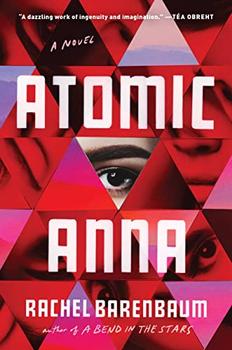Summary | Excerpt | Reading Guide | Reviews | Beyond the Book | Read-Alikes | Genres & Themes | Author Bio

This article relates to Atomic Anna
 In Atomic Anna, the protagonist Anna Berkova is the Soviet Union's top nuclear scientist. Collaborating with famed German chemist Otto Hahn at the Kaiser Wilhelm Institute for Chemistry in Berlin, Anna helps discover nuclear fission, the reaction which serves as the basis for nuclear power. As World War II begins, Anna escapes Germany and returns to her homeland, where she joins the Soviet bomb project to develop a weapon to stop Hitler. Her dedication to her work comes at the cost of her family — and the resulting weapon could take thousands of lives — but Anna refuses to let the science go unstudied.
In Atomic Anna, the protagonist Anna Berkova is the Soviet Union's top nuclear scientist. Collaborating with famed German chemist Otto Hahn at the Kaiser Wilhelm Institute for Chemistry in Berlin, Anna helps discover nuclear fission, the reaction which serves as the basis for nuclear power. As World War II begins, Anna escapes Germany and returns to her homeland, where she joins the Soviet bomb project to develop a weapon to stop Hitler. Her dedication to her work comes at the cost of her family — and the resulting weapon could take thousands of lives — but Anna refuses to let the science go unstudied.
Although Anna and her role in the project are fictional, the Soviet atomic bomb project is not. Russian scientists began researching radioactive elements as early as 1910, but the Russian Revolution and the subsequent civil war slowed their efforts. Research between Soviet and European scientists commenced throughout the 1920s, but it wasn't until 1938 when Otto Hahn reported his discovery of nuclear fission in Berlin that scientists truly realized the potential for the development of weapons. For the next two years, Soviet physicists attempted to reproduce Hahn's data, but with the outbreak of World War II, many scientists were drafted to work on what were deemed more important projects. Only a small team of physicists continued working on the "uranium problem," as the attempts to replicate Hahn's experiment came to be known.
In 1942, Soviet leaders correctly surmised that Germany, America and Britain had each developed their own secret nuclear research program and grew appropriately concerned about the consequences of not having their own uranium bomb to deter foreign aggression. Thus, Joseph Stalin authorized the development of the Soviet atomic bomb project. Compared with the Americans' Manhattan Project, the Soviet program was small. Comprised of approximately 20 physicists, many doubted that the team would succeed in building a bomb using weapon-grade uranium. In 1945, the United States dropped atomic bombs on Hiroshima and Nagasaki, pushing the Soviets to speed up the project. Their research was facilitated by confidential information they received about the Manhattan Project.
The most well-known spy for the Soviets was British physicist Klaus Fuchs. Fuchs first approached the Soviets in 1941 and began sharing information from the British atomic research program. In 1944, Fuchs was sent to America to assist in the Manhattan Project, and he continued to share data with his Soviet handlers. This information included the Americans' use of plutonium in one of their bombs, as well as a diagram of Fat Man, the atomic bomb dropped on Nagasaki. Fuchs was caught in 1950 and convicted of espionage, but by then, the damage was done. The Soviets built their first nuclear reactor in 1946 and dropped their own atomic bomb at a test site in Kazakhstan three years later.
Atomic Anna's titular character believed it was her duty to help her country develop an atomic bomb regardless of the cost. The novel addresses the ethics of such a decision, but Anna's only regret is choosing her work over family. In real life, many of the scientists who worked on atomic bomb projects came to regret doing so. Nonetheless, the development of such a weapon was seen as necessary to winning World War II at the time, and it was important to be the first country with such weaponry. Although Russia was not the first, their research and espionage-gained intelligence allowed them to eventually develop and test the atomic bomb, making them one of the five nuclear-weapon states recognized today.
Replica of the Soviet atomic bomb called Joe-1, courtesy of Atomic Heritage Foundation
Filed under People, Eras & Events
![]() This "beyond the book article" relates to Atomic Anna. It originally ran in May 2022 and has been updated for the
March 2023 paperback edition.
Go to magazine.
This "beyond the book article" relates to Atomic Anna. It originally ran in May 2022 and has been updated for the
March 2023 paperback edition.
Go to magazine.
Happiness makes up in height for what it lacks in length.
Click Here to find out who said this, as well as discovering other famous literary quotes!
Your guide toexceptional books
BookBrowse seeks out and recommends the best in contemporary fiction and nonfiction—books that not only engage and entertain but also deepen our understanding of ourselves and the world around us.